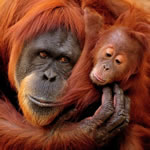 Orangutans nurse their young longer than any other mammal. But exactly how long has remained a mystery—it’s not easy for researchers to observe these great apes high in their tree-top homes. So instead of looking for their answer in the canopies, a group of scientists searched for clues in orangutan teeth. Along with calcium, an element called barium transfers from mom to baby through milk and ends up in the bones and teeth of her offspring. By mapping out barium deposited in the teeth over time, scientists estimated how much each immature orangutan was nursing. They found that some of the apes depend on their mother’s milk even longer than previously thought—the oldest tooth donor was still nursing when he died at almost 9 years old, the researchers report today in Science Advances. But barium maps didn’t show offspring suckling consistently throughout that time. Instead, nursing appeared to fluctuate throughout the year, likely meaning moms take it up again when fruits and other foods are scarce. This long developmental period may make orangutans even more susceptible to the rapid habitat loss predicted to cut their numbers in half in the next decade.
Orangutans nurse their young longer than any other mammal. But exactly how long has remained a mystery—it’s not easy for researchers to observe these great apes high in their tree-top homes. So instead of looking for their answer in the canopies, a group of scientists searched for clues in orangutan teeth. Along with calcium, an element called barium transfers from mom to baby through milk and ends up in the bones and teeth of her offspring. By mapping out barium deposited in the teeth over time, scientists estimated how much each immature orangutan was nursing. They found that some of the apes depend on their mother’s milk even longer than previously thought—the oldest tooth donor was still nursing when he died at almost 9 years old, the researchers report today in Science Advances. But barium maps didn’t show offspring suckling consistently throughout that time. Instead, nursing appeared to fluctuate throughout the year, likely meaning moms take it up again when fruits and other foods are scarce. This long developmental period may make orangutans even more susceptible to the rapid habitat loss predicted to cut their numbers in half in the next decade.
By Lindzi WesselMay. 17, 2017 , 2:00 PM
Source:
DOI: 10.1126/science.aal1202

Leave A Comment